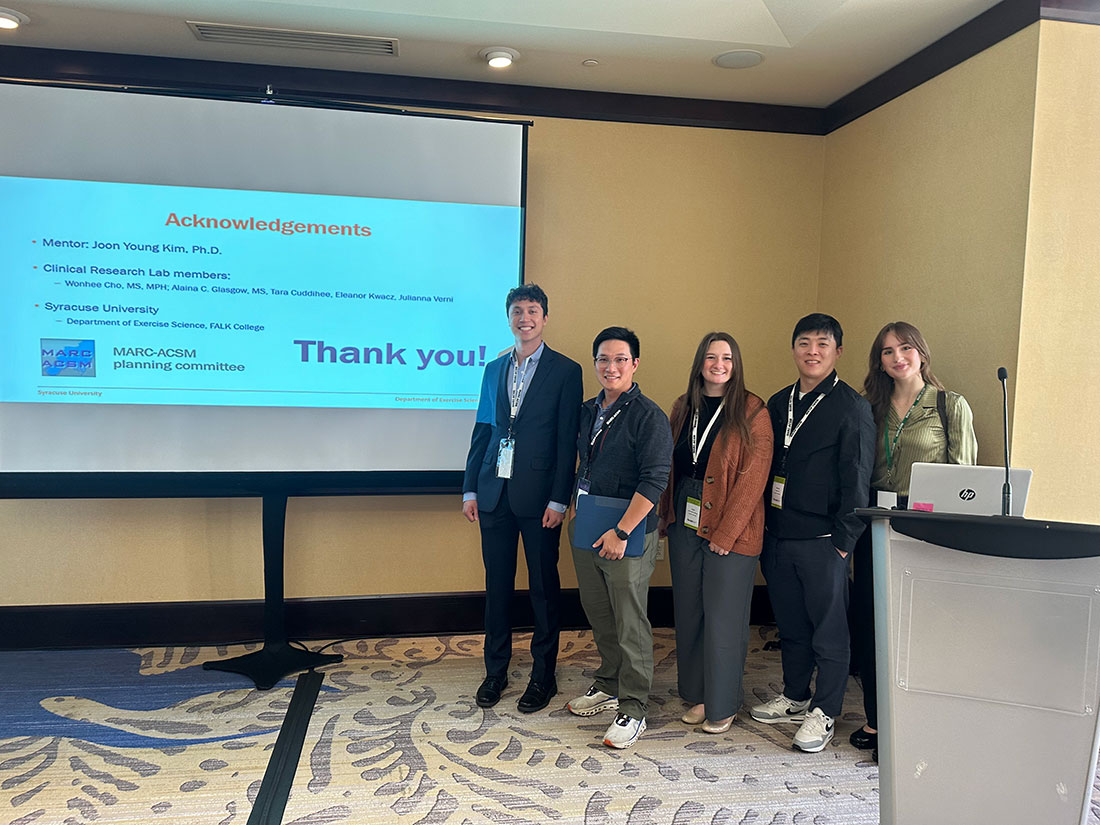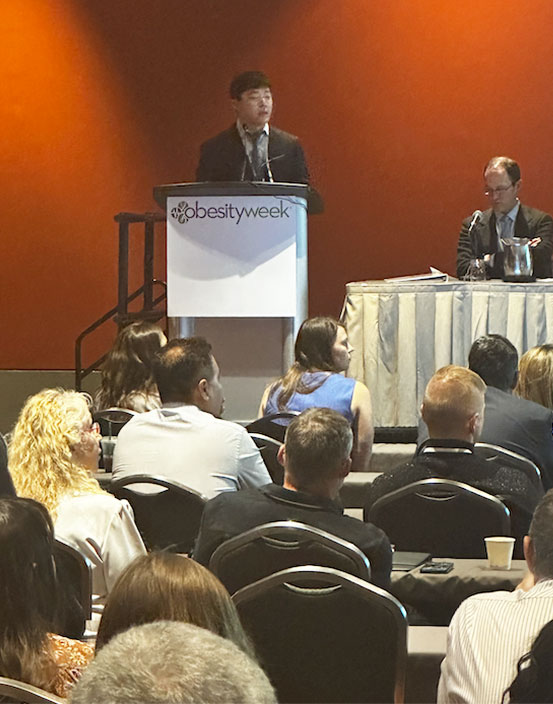
Four students in the Department of Exercise Science in the Falk College of Sport and Human Dynamics were recognized for their exceptional research at the recent Mid-Atlantic Regional Chapter of the American College of Sports Medicine (MARC-ACSM) annual conference in Lancaster, Pennsylvania.
Doctoral students Alaina Glasgow and Andrew Heckel and undergraduate student Tara Cuddihee presented their research at the conference, while doctoral student Wonhee Cho presented for undergraduate student Eleanor Kwacz, who was unable to attend. (Read more about Cho and his research later in this story).
Heckel’s study was selected as a top five doctoral abstract, and Kwacz’s research was chosen as a top five undergraduate abstract. Exercise Science Assistant Professor Joon Young Kim works with all four students on their research and says they “demonstrate an impressive level of scientific understanding, critical thinking, hard work, and dedication.”
“The students’ curiosity, intellectual rigor, and resilience in tackling complex challenges reflect not only their individual talents but also the supportive academic environment that fosters their growth,” Kim says. “These students represent the next generation of researchers, innovators, and problem-solvers.”
MARC-ACSM is comprised of a diverse group of professionals and students dedicated to the advancement of sports medicine and exercise science. The Mid-Atlantic Chapter represents Delaware, Maryland, New Jersey, New York, Pennsylvania, West Virginia, and Washington, D.C., and “the chapter seeks to communicate scientific information, provide a forum for research, foster professional peer interaction, and support career growth,” according to its website.
Two Falk College faculty members also presented at the conference: Exercise Science Associate Professor Tiago Barreira (Measuring Sleep with Wearable Devices), and Department of Nutrition and Food Studies Assistant Professor Jessica Garay (Moving Beyond Female Athlete Triad: Relative Energy Deficiency in Sport).
“This recognition strengthens Syracuse University’s reputation, opening doors to further collaborations, future funding opportunities, and increased visibility within the academic community,” Kim says. “It highlights the faculty’s mentorship, the quality of resources available to students through their mentor, department, college, and university, and the university’s role in advancing knowledge in their fields.”
To learn more about their research journey in Falk College, we asked doctoral student Andrew Heckel G’25 and Eleanor Kwacz ’27, a health and exercise science major on the pre-med track, to tell us about the MARC-ACSM conference, their presentations, and their mentors. Here’s what they wrote:
Can you describe your abstract that was selected as a top five abstract at the conference?
Eleanor: My abstract focused on whether baseline visceral fat could potentially be an influence on the interindividual differences seen in exercise intervention outcomes. In exercise interventions for type 2 diabetes, two individuals can follow the same protocol and see completely different results. This research sought to see if visceral fat may be the predictive element that can tell us if an individual would respond to exercise intervention, or if they would be a better candidate for a different intervention.
There was an ongoing HIIT (high-intensity interval training) intervention study within Dr. Kim’s lab, and we further analyzed this data to create my abstract. We found that low density lipoproteins and mean arterial pressure had greater improvements after exercise intervention in groups with high baseline visceral fat compared to low. This led us to conclude that there is reason to further research this topic.
Andrew: The title of the abstract we submitted was “The Potential Role of Physical Activity on Hypertension in Immigrants and Non-Immigrants.” We had originally set out to determine if physical activity might explain potential differences in hypertension prevalence between immigrants and non-immigrants. Using a publicly available dataset representative of the U.S. population, we found that hypertension prevalence was lower in immigrants compared to non-immigrants and that these differences were not due to physical activity.
These findings were interesting, so we dug a little deeper and found that immigrants were less likely to have health insurance coverage compared to non-immigrants. After running further analyses, we found that lower health insurance coverage in immigrants acted as a mediator for their lower hypertension rates. From this information, we concluded that immigrants may be less likely to receive a hypertension diagnosis; therefore, hypertension may be underdiagnosed in immigrant populations.
What does it mean to you for your abstract to be recognized at this prestigious conference?
Eleanor: I’m so grateful that the work being done in Dr. Kim’s lab is getting recognition. I know that none of this would have been possible for me without all of the members of our lab, especially Wonhee Cho. It means a lot that I was selected to represent our lab and all of the hard work that has gone into this research. This was such a unique opportunity!
Andrew: I’m happy that other people have read our research and feel that it’s important enough to be recognized at MARC-ACSM. I’m passionate about this project as it’s a topic that hits very close to home for me, so it makes me happy that our research is recognized in such a way that I’m able to share what I’m passionate about with a broader audience.
Who is your mentor, and what has that person meant to your academic career?
Eleanor: Dr. Kim kickstarted my career in undergraduate research by being willing to give a young and inexperienced freshman a spot in his lab. And since then, Dr. Kim has continued to share his wealth of knowledge with me and pushed me to research achievements I would have never dreamed of.
I never imagined I could be creating abstracts and presenting at an American College of Sports Medicine conference, and yet here I am. My academic career trajectory has been forever changed by Dr. Kim, and the opportunities he has pushed me to take will open doors I never saw as possible.
Andrew: I have been incredibly fortunate to work with Dr. Kim throughout this project and my entire Ph.D. journey. Dr. Kim was the one who encouraged me to explore this research project and submit the abstract to MARC-ACSM. We have continued working on this project and submitted a manuscript for publication, which I hope we’ll be able to publish soon so we can share our findings with an even larger audience.
Dr. Kim has been integral to my academic journey as he’s always encouraging me to pursue new research opportunities and always happy help to lend his advice and expertise to help me along my academic journey. I definitely don’t thank him enough for his mentorship, but I’m extremely grateful to have the opportunity to work with him and am a better student because of it.
What would you say to incoming or future Exercise Science students about your experience at Falk College?
Eleanor: I have been welcomed into Falk with the most open arms since my first day here. The Department of Exercise Science has the most amazing group of professors who are so knowledgeable and genuinely want students to be a part of what they are creating here.
When I was looking for research, every faculty member in the department was so happy to meet with me and tell me about what they were doing and how I could be a part of it. Falk College will offer you opportunities that you thought were never possible, from presenting at research conferences to the chance to climb Mount Everest, so take advantage of everything in front of you!
Andrew: The small bit of advice I would give to future Exercise Science students is to say “yes” to as many new experiences as you can. I’ve done so many things in the past four years that, if you told me at the beginning of graduate school that I would be doing these things, I would have probably laughed and told you that must have been thinking of someone else.
But the faculty members in our department are always presenting new opportunities to us, and some of my most enriching experiences have come from just saying “yes” to these opportunities, even if I didn’t feel like I was ready for them. I’ve been able to grow and become a better person because of these experiences, and I hope that other students will be encouraged to do the same.

Stronger as a Team
Wonhee Cho, who presented for Kwacz at the MARC-ACSM conference, is another student who has made a significant impact the Department of Exercise Science.
Cho’s most recently published research, co-authored by Kim and his team members, appeared in Science Direct, one of the world’s leading sources for scientific, technical, and medical research. He recently presented his abstract at The Obesity Society annual meeting in San Antonio, Texas, where he received $1,500 for being selected as a finalist for the 2024 Ethan Sims Young Investigator Award.
Cho’s abstract presentation, “Relative Fat Mass as an Estimator of Abdominal Adiposity in Youth Across the BMI Spectrum,” was the result of a collaboration between Kim’s lab and UPMC Children’s Hospital of Pittsburgh, where Kim did his postdoctoral training before joining Syracuse University.
Heckel says he would have not been recognized by MARC-ACSM without the support and teamwork of his fellow lab mates, Cho and doctoral student Alaina Glasgow.
“Dr. Kim encourages us all to work together as a team, and I’m a better student and researcher today because of the people I get to surround myself with,” Heckel says. “I’m very thankful to have been able to work alongside Wonhee and Lainie during this project, and I’m excited for the future research we’ll all be able to do together.”
Visit the Department of Exercise Science website to learn more about Kim’s Clinical Research Laboratory and exercise science academic programs, experiential learning, and career opportunities. If you’d like to participate in research being conducted by the lab, contact Kim at jkim291@syr.edu.
